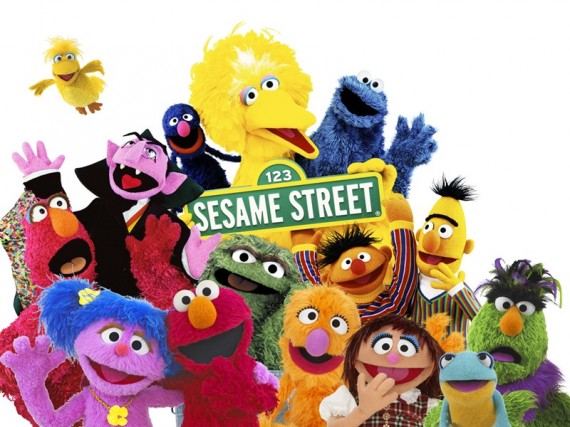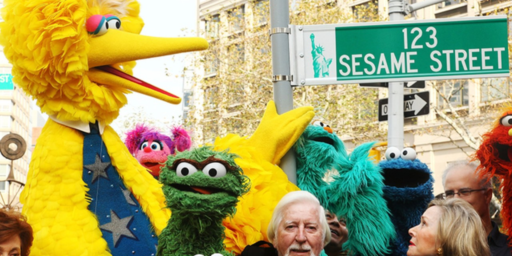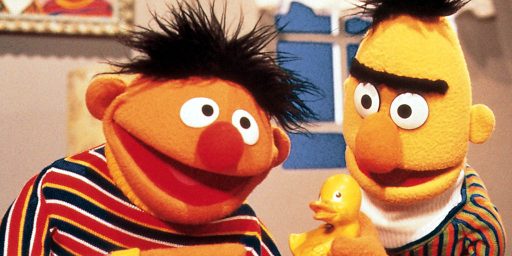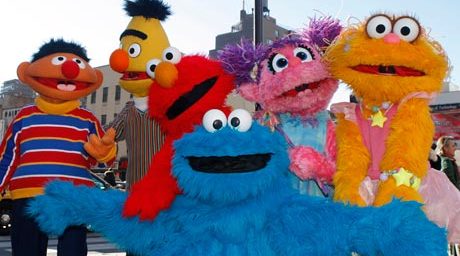Sesame Street Moves To HBO
So does this mean Big Bird will show up on Game Of Thrones?
Sesame Street is moving to HBO:
The letters of the day on “Sesame Street” are H, B and O.
Sesame Workshop, the nonprofit group behind the children’s television program, has struck a deal with HBO, the premium cable network, that will bring the next five seasons of “Sesame Street” to HBO and its streaming outlets starting this fall.
The partnership will allow Sesame Workshop to significantly increase its production of “Sesame Street” episodes and other new programming. The group will produce 35 new “Sesame Street” episodes a year, up from the 18 it produces now. Sesame Workshop also will create a spinoff series based on the “Sesame Street” Muppets and another new educational series for children.
After nine months of programming exclusively on HBO, the shows also will be available free on PBS, its home for the last 45 years. “Sesame Street” will also continue its run on PBS this fall, with the season featuring a selection of episodes from the last several seasons edited in new ways.
“Sesame Workshop’s new partnership does not change the fundamental role PBS and stations play in the lives of families,” Anne Bentley, a PBS spokeswoman, said in a statement, noting that PBS stations reach more children ages 2 to 5, more mothers of children under 6 and more low-income children than any children’s TV network, according to Nielsen.
Financial terms of the deal were not disclosed.
Sesame’s partnership with HBO comes at a critical time for the children’s television group. Historically, less than 10 percent of the funding for “Sesame Street” episodes came from PBS, with the rest financed through licensing revenue, such as DVD sales. Sesame’s business has struggled in recent years because of the rapid rise of streaming and on-demand viewing and the sharp decline in licensing income. About two-thirds of children now watch “Sesame Street” on demand and do not tune in to PBS to watch the show.
PBS was not able to make up the difference, so Sesame was forced to cut back on the number of episodes it produced and the creation of other new material.
Jeffrey D. Dunn, chief executive of Sesame Workshop, said that the partnership with HBO would allow the group to continue to produce “Sesame Street” and to further its mission to help educate children.
“The partnership is really a great thing for kids,” Mr. Dunn said. “We’re getting revenues we otherwise would not have gotten, and with this we can do even more content for kids.”
For HBO, the partnership provides the network with prestigious and popular television programming for both its traditional television network and its new stand-alone streaming service HBO Now, which is aimed at people who do not have or do not want cable TV subscriptions. In addition to the new series, HBO licensed more than 150 library episodes of “Sesame Street.” It also licensed about 50 past episodes of “Pinky Dinky Doo” and “The Electric Company” from Sesame Workshop.
On the surface at least, this seems like a rather odd combination for both companies involved. From HBO’s point of view, it’s certainly different from the content that it has come to be known for, especially when it comes to original programming such as Game of Thrones. Of course, branching out into new forms of entertainment is arguably in the company’s interest since it has the potential to increase audience size. This is especially now the HBO is marketing its ow streaming service along with the more traditional enhanced cable package that it has traditionally been part of. The question, of course, is how many people who don’t have HBO at this point, either via cable or the new streaming service, are going to be inclined to sign up for it because they now carry original Sesame Street programming. From Sesame Workshop’s perspective, this at least seems like a marked departure from the mission that they have followed for the past 46 years or more regarding children’s programming and education. When they’re broadcasting on PBS, which is basically available to anyone with a television set, that mission makes sense. When they’re broadcasting on a subscription based network better known for movies and more adult programming, it doesn’t make nearly much sense. Yes, the programs will eventually show up on PBS for at least the first five years of this deal but one wonders how long that will last. The reality, of course, is that Sesame is long been a profit-making enterprise rather than one devoted solely to the seemingly non-profit goals that it claims. Thanks to merchandising deals and other media ventures, the company has made vast amounts revenue from licensing Sesame Street characters and material for other purposes. As many critics of federal funding for PBS have noted, none of this money ends up being recycled into public broadcasting. Of course, thanks to shows like Downton Abbey, PBS itself is finding that non-government sources of funding are quite lucrative, which raises the question of why they need the subsidy to begin with. This is especially true given that fact that federal funding amounts to less than 15% of PBS’s annual funding,
I’m sure this will be a very profitable deal for both Sesame Workshop and HBO. While the terms of the deal haven’t been disclosed yet, They most assuredly somewhere in the eight figure range, if not higher. Additionally, the prospect of news audiences will lead to at least some new subscribers for HBO and more lucrative marketing deals for Sesame Workshop. Perhaps the most valuable thing to come from the deal, though, will be that will puncture the conceit that there really is anything “public” about public broadcasting anymore.







Actually, a remake of Game of Thrones but with the Sesame Street characters would be something a lot of us would watch…
Of course not. Big Bird on Game of Thrones would be ridiculous.
Now, Grover on the other hand…
https://www.youtube.com/watch?v=dhWUFXvaZjo
HBO does include HBO Family, which has a lot of really good children’s programming and would be a natural home for Sesame Street.
It’ll be fun to watch Sesame Street with a TV-MA rating
There is a bit of history here, at least with the old Jim Henson Productions. Fragile Rock was shown on HBO in the mid 80s.
@C. Clavin: You already CAN do that. Amazon has parental warnings about inappropriate content on Seasons 1-3.
What concerns me the most with a good background in psychology is that the show is being shortened to a half hour, because like others in our society, attention spans are getting shorter. It’s as if we are developing a form of acquired autism, where we will no longer be read books or watch entire movies are some point because if the fracture of attention spans.
Can we finally shut down PBS?
I was just flipping the channels, and my local PBS station was playing a song about “opening new horizons”, just before a Peter, Paul, and Mary special.
Ah, Sesame Street for the 10-percenters; it’s just like the original vision, except they’ll move to the suburbs and wear polo shirts.
@PD Shaw: I wish I had said this. Brilliant!
Nothing tops the ‘Land of Gorch’ sketches from Saturday Night Live in the ’70s.
@C. Clavin: I want Al Swearengen to show up on Sesame Street.
@Pinky:
I come to this site mainly for the diversity of thought.
@Pinky: And to continue on that theme, PBS has that same problem, lack of diversity of thought. It’s an entire network devoted to keeping the viewer in his comfort zone. Not the only such network, for sure, but it thinks of itself as the opposite of that.
@Pinky:
PBS provides a great service to people without cable. In most markets, you can still get PBS over the air, and no other network offers the breadth of programming that PBS offers.
On PBS this week alone, you can get “Cubaamerican”, great documentary, BBC World News and the usual eclectic mix of politics, entertainment, documentaries, news, and lifestyle programming.
Without PBS, would anyone know who William F. Buckley is? “Firing Line” was a PBS staple for over a decade. Yeah, That William F. Buckley.
Without his start in PBS, and the multiple Emmy’s he won while there, would Hugh Hewitt have a successful broadcast career in talk radio?
Conservatives love to kick at PBS, but there are more good reasons for continuing it, than shutting it down.
@Pinky:
That would be Fox. PBS has the most boring content imaginable so no one’s comfortable.
Try watching the PBS NewsHour. Informative! Also can put me to sleep in, oh, six minutes.
@EddieInCA: PBS defenders have been milking the Buckley thing for years. Before that, they have to go back to some piece that Milton Friedman did in the 1960’s. But it’s not just ideological consistency that I’m complaining about; it’s the uniformity and unoriginality of their programming. “Where else but PBS” their ads say, but the answer to that question is YouTube, Hulu, and new media in general. It’s one of those things that we need to reexamine. What percentage of people don’t have internet, dish, or cable access due to costs, and rely on PBS? Can those people be reached more economically in another way? In my area we can pick up separate 5 PBS stations – that’s not necessary if the goal is to reach those without access. With the new digital broadcast laws, stations could be required to include a news and arts broadcast. There are ways of doing this better.
@Tillman: I’m stunned that someone on this thread would drop an FNC bomb.
As I said, there are networks that cocoon people in their comfort zones, but PBS seems unique to me in that they brag about doing the opposite, and are doing so on the public dime (or at least a few pennies of it).
@Pinky: So, what, calling out Fox News is now on par with cussing to a conservative? 🙂
But I think you missed what I said. I am fundamentally disagreeing with you. You’re saying PBS brags about not having a cocoon, but has a cocoon. I’m saying it couldn’t possibly have a cocoon given how boring its content is, and now I’m adding that they can’t possibly have bragged about being boring.
Also, when have they bragged? I’m familiar with Fox’s bragging about being fair and balanced, CNN’s bragging about “the best political whatsit team or another,” and MSNBC’s general…whatever it is they do*, but PBS…maybe I’ve slept through it.
* I honestly have no clue. I haven’t taken in TV news in large doses in five years now.